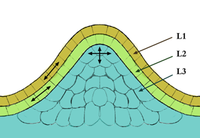
Photo from wikipedia
Abstract Evidence of the effects of agriculture on natural systems is widespread, but potential evolutionary responses in nontarget species are largely uncharacterized. To explore whether exposure to agrochemicals may influence… Click to show full abstract
Abstract Evidence of the effects of agriculture on natural systems is widespread, but potential evolutionary responses in nontarget species are largely uncharacterized. To explore whether exposure to agrochemicals may influence selective pressures and phenotypic expression in nonagricultural plant populations, we characterized the expression of putative antiherbivore defense phenotypes in three nonagricultural species found upstream and downstream of irrigated rice fields in Guanacaste Province, Costa Rica. We found that plants downstream of chemically intensive agriculture showed shifts toward reduced expression of putative antiherbivore defenses relative to upstream counterparts. In two of three tested species, leaf extracts from downstream plants were more palatable to a generalist consumer, suggesting a possible reduction of chemical defenses. In one species with multiple modes of putative defenses, we observed parallel reductions of three metrics of putative biotic and physical defenses. These reductions were concurrent with reduced herbivore damage on downstream plants. Together, these results suggest that agriculture has the potential to alter intraspecific phenotypic expression, ecological interactions, and natural selection in nontarget plant populations.
Journal Title: Ecology and Evolution
Year Published: 2021
Link to full text (if available)
Share on Social Media: Sign Up to like & get
recommendations!